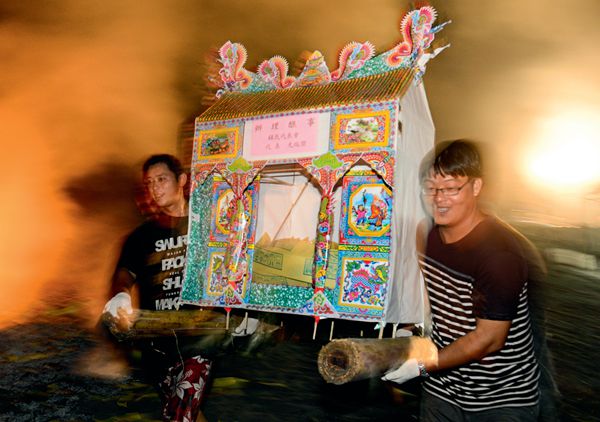Hong Kong's Ullambana Festival: Chinese halloween
 0 Comment(s)
0 Comment(s) Print
Print E-mail China Today, August 9, 2016
E-mail China Today, August 9, 2016
|
|
|
Residents of Yilan County, Taiwan, launch a palace-shaped river lantern during the Hungry Ghost Festival. |
Taoists call the Hungry Ghost Festival the Zhongyuan Festival, which is for them a celebration of the birthday of the Earth God. Taoist priests accordingly set up altars and chant sutras to celebrate this grand occasion. Ghosts leave the underworld and devotees offer sacrifices to pray for their ancestors' happiness in the afterlife, and also beg the Earth God to pardon their sins and let them enter heaven. This is a main reason why the festival is a folk holiday.
The Ullambana Festival originates in a Buddhist legend. Mu Lian was a Buddhist disciple, but his mother, who was deeply sinful, was eventually reborn in the lower realm of Hungry Ghosts. Her son presented offerings of food to her, but in her mouth they transformed into raging flames. Buddha instructed Mu Lian to prepare for his deceased mother an extra place at the family dinner table on the 15th day of the seventh lunar month. Monks from 10 directions could then help him to feed her. People still follow this Buddhist rite by holding a memorial ceremony for wandering ghosts. Widely told in China, this Buddhist parable is intended to encourage people to be kind and practice filial piety, a sentiment echoed in traditional Chinese thought.
The Hungry Ghost Festival and the Ullambana Festival gradually integrated with the Han people's belief in ghosts, and eventually became the grand folk festival at which to offer sacrifices and absolve others from guilt.
Customs in Various Regions
According to folk legend, the gates to the underworld open on the first day of the seventh lunar month. Ghosts then come to receive earthly sacrifices, such as wealth accruing from the burning of paper money, and return on the last day of the month. The seventh lunar month is consequently abundant in ghost-appeasing rituals.






